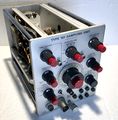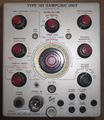1S1: Difference between revisions
No edit summary |
mNo edit summary |
||
| (23 intermediate revisions by 6 users not shown) | |||
| Line 1: | Line 1: | ||
{{Plugin Sidebar | {{Plugin Sidebar | ||
|manufacturer=Tektronix | |||
summary= | |series=500-series scopes | ||
image=1s1 | |type=1S1 | ||
caption=1S1 front view| | |summary=1 GHz sampling system | ||
introduced=1965 | | |image=Tek 1s1 front2.jpeg | ||
discontinued=1974 | | |caption=1S1 front view | ||
|introduced=1965 | |||
manuals= | |discontinued=1974 | ||
* [[Media:070-0475-00.pdf|Tektronix 1S1 Manual ( | |designers=Gene Cowan;Chuck Edgar | ||
* [ | |manuals= | ||
* [ | * [[Media:070-0475-00.pdf|Tektronix 1S1 Manual 070-0475-00]] (retouched) | ||
* [ | * [[Media:tek_1s1_field_training_package.pdf|Tektronix 1S1 Field Training Package]] (OCR) | ||
* [[1S1/Repairs|David Wise 1S1 Repair Notes]] | |||
<small> | |||
'''Alternate copies''' | |||
* [https://w140.com/1s1.pdf Tektronix 1S1 Manual 070-0475-00] | |||
* [https://bama.edebris.com/download/tek/1s1/1s1.djvu Tektronix 1S1 Manual] (DjVu @ BAMA) | |||
</small> | |||
}} | }} | ||
The '''Tektronix 1S1''' is a [[sampling oscilloscope|sampling]] plug-in for [[500-series scopes]]. | The '''Tektronix 1S1''' is a [[sampling oscilloscope|sampling]] plug-in for [[500-series scopes]], designed by [[Gene Cowan]] (vertical) and [[Chuck Edgar]] (horizontal), [[introduced in 1965]] and sold through 1973. | ||
It is essentially one channel of a sampling unit and a timing unit from a [[661]]. It has its own trigger and timebase. | It is essentially one channel of a sampling unit and a timing unit from a [[661]]. It has its own trigger and timebase. | ||
The oscilloscope's timebase is usually set to a relatively slow sweep rate when using a 1S1. Alternatively, the sweep on the oscilloscope can | The oscilloscope's timebase is usually set to a relatively slow sweep rate when using a 1S1. Alternatively, the sweep on the oscilloscope can free-run, and the horizontal voltage from the oscilloscope can be used to control the 1S1, as described below. | ||
and the horizontal voltage from the oscilloscope can be used to control the 1S1, as described below. | |||
The 1S1 has a 50 Ω [[GR-874 connector]] for signal input. The plug-in supplies power (+100 V and −12.6 V) to accessories like the [[P6032]] Cathode Follower Probe, the [[281]] | The 1S1 has a 50 Ω [[GR-874 connector]] for the signal input. The plug-in supplies power | ||
(+100 V and −12.6 V) to accessories like the [[P6032]] Cathode Follower Probe, the | |||
[[281|281 TDR Pulser]], and the [[282|Type 282 Probe Adapter]], which is an active buffer | |||
to allow the use of high-impedance probes with the 50 Ω input of the 1S1 (at reduced bandwidth). | |||
The 1S1 can operate in normal self-swept mode or an external sweep signal can be applied to the 1S1. | {{BeginSpecs}} | ||
{{Spec| Rise time | 350 ps}} | |||
{{Spec| Bandwidth | 1 GHz }} | |||
{{Spec| Trigger bandwidth | 100 MHz (Norm/Auto trigger), 1 GHz (HF sync) }} | |||
{{Spec| Vertical deflection | 2 mV/div to 200 mV/div in 1−2−5 sequence }} | |||
{{Spec| Sweep rate | 50 µs/div to 1 ns/div in 1−2−5 sequence, magnifier up to ×100 }} | |||
{{Spec| Input impedance | 50 Ω }} | |||
{{Spec| Output | Front-panel, vertical 200 mV/div; horizontal 1 V/div into a high-impedance load }} | |||
{{Spec| Maximum input | ±2 V }} | |||
{{EndSpecs}} | |||
==Operation== | |||
The 1S1 can operate in normal self-swept mode, or an external sweep signal can be applied to the 1S1. | |||
With the 1S1's internal sweep disabled, the horizontal-in and vertical-out connections can be used | With the 1S1's internal sweep disabled, the horizontal-in and vertical-out connections can be used | ||
so the 1S1 acts as a lookup table, a mapping of X to Y, a function. | so the 1S1 acts as a lookup table, a mapping of X to Y, a function. | ||
The 661 also has this capability, in its "A vert/B horiz" mode, which is like X-Y mode for a sampler. | The 661 also has this capability, in its "A vert/B horiz" mode, which is like X-Y mode for a sampler. | ||
In this mode, the horizontal-in voltage controls the time after the trigger event when the sample should be taken, | In this mode, the horizontal-in voltage controls the time after the trigger event when the sample should be taken, | ||
and the vertical-out voltage corresponds to the voltage measured at that instant. | and the vertical-out voltage corresponds to the voltage measured at that instant. | ||
This allows a waveform to be digitized using an arbitrarily slow DAC to generate the horizontal voltage | This allows a waveform to be digitized using an arbitrarily slow DAC to generate the horizontal voltage | ||
and ADC to read the sampled output. But perhaps more importantly, by setting a constant horizontal-in voltage, | and ADC to read the sampled output. But perhaps more importantly, by setting a constant horizontal-in voltage, | ||
it allows the output signal at one equivalent time instant to be processed in the time domain. | it allows the output signal at one equivalent time instant to be processed in the time domain. | ||
For example, this allows the voltage to be low-pass filtered, so that it can be more accurately measured. | For example, this allows the voltage to be low-pass filtered, so that it can be more accurately measured. | ||
The other reason why one might want a signal that consists of multiple sequential measurements | The other reason why one might want a signal that consists of multiple sequential measurements | ||
of the same equivalent-time instant is that statistics can be calculated on these observations. | of the same equivalent-time instant is that statistics can be calculated on these observations. | ||
| Line 39: | Line 62: | ||
The horizontal-in voltage can also be produced, in "manual" mode, by setting a knob on the 1S1. | The horizontal-in voltage can also be produced, in "manual" mode, by setting a knob on the 1S1. | ||
When the 1S1 is set for INT trigger signal, the EXT TRIG input is terminated with 50 Ω. | |||
==Internals== | |||
The [[sampler]] in the 1S1 is quite different from the sampler in the [[1S2]]. The 1S1 uses a [[sampling diodes|four-diode]] sampling bridge, terminated within the 1S1. The 1S2 uses a two-diode feed-through sampler, typical for TDR instruments. | |||
The [[ | The 1S1 uses two type [[8416]] tubes, the 12V version of the [[6DJ8]]. | ||
==Pictures== | ==Pictures== | ||
<gallery> | <gallery> | ||
Tek 1s1.jpg|front | Tek 1s1 bottom2.jpeg | ||
Tek 1s1 front2.jpeg | |||
Tek 1s1 left2.jpeg | |||
Tek 1s1 rear3.jpeg | |||
Tek 1s1 right2.jpeg | |||
Tek 1s1 top2.jpeg | |||
Tek 1s1.jpg|Front view | |||
Tek_1S1_Iso.jpeg | 1S1 | |||
Tek_1S1_Front.jpeg | Front | |||
1s1 front details.JPG | Front | |||
Tek_1S1_RHS.jpeg | LHS | |||
Tek_1S1_LHS.jpeg | RHS | |||
Tek_1S1_Top.jpeg | Top | |||
Tek_1S1_Bottom.jpeg | Bottom | |||
1s1 front.jpg | 1s1 front.jpg | ||
1s1 left.jpg | 1s1 left.jpg | ||
1s1 right.jpg | 1s1 right.jpg | ||
Tek 1s1 rear.jpg| | Tek 1s1 rear.jpg|Rear | ||
Tek 1s1 rear2.jpg| | Tek 1s1 rear2.jpg|Rear | ||
Tek_1S1_Delayline.jpeg | Delay Line | |||
1s1 block.jpg|block diagram | 1s1 block.jpg|block diagram | ||
1S1_in_535A.png| 1S1 in operation | |||
Tektronix 1S1 probe power connector.jpg | 1S1 probe power connector | |||
</gallery> | </gallery> | ||
==Components== | |||
{{Parts|1S1}} | |||
[[Category:500 series sampling plugins]] | |||
[[Category:500 series plugins]] | |||
[[Category:GR874]] | [[Category:GR874]] | ||
Latest revision as of 03:36, 5 June 2024
The Tektronix 1S1 is a sampling plug-in for 500-series scopes, designed by Gene Cowan (vertical) and Chuck Edgar (horizontal), introduced in 1965 and sold through 1973.
It is essentially one channel of a sampling unit and a timing unit from a 661. It has its own trigger and timebase.
The oscilloscope's timebase is usually set to a relatively slow sweep rate when using a 1S1. Alternatively, the sweep on the oscilloscope can free-run, and the horizontal voltage from the oscilloscope can be used to control the 1S1, as described below.
The 1S1 has a 50 Ω GR-874 connector for the signal input. The plug-in supplies power (+100 V and −12.6 V) to accessories like the P6032 Cathode Follower Probe, the 281 TDR Pulser, and the Type 282 Probe Adapter, which is an active buffer to allow the use of high-impedance probes with the 50 Ω input of the 1S1 (at reduced bandwidth).
Key Specifications
| Rise time | 350 ps |
|---|---|
| Bandwidth | 1 GHz |
| Trigger bandwidth | 100 MHz (Norm/Auto trigger), 1 GHz (HF sync) |
| Vertical deflection | 2 mV/div to 200 mV/div in 1−2−5 sequence |
| Sweep rate | 50 µs/div to 1 ns/div in 1−2−5 sequence, magnifier up to ×100 |
| Input impedance | 50 Ω |
| Output | Front-panel, vertical 200 mV/div; horizontal 1 V/div into a high-impedance load |
| Maximum input | ±2 V |
Operation
The 1S1 can operate in normal self-swept mode, or an external sweep signal can be applied to the 1S1. With the 1S1's internal sweep disabled, the horizontal-in and vertical-out connections can be used so the 1S1 acts as a lookup table, a mapping of X to Y, a function.
The 661 also has this capability, in its "A vert/B horiz" mode, which is like X-Y mode for a sampler. In this mode, the horizontal-in voltage controls the time after the trigger event when the sample should be taken, and the vertical-out voltage corresponds to the voltage measured at that instant.
This allows a waveform to be digitized using an arbitrarily slow DAC to generate the horizontal voltage and ADC to read the sampled output. But perhaps more importantly, by setting a constant horizontal-in voltage, it allows the output signal at one equivalent time instant to be processed in the time domain. For example, this allows the voltage to be low-pass filtered, so that it can be more accurately measured.
The other reason why one might want a signal that consists of multiple sequential measurements of the same equivalent-time instant is that statistics can be calculated on these observations. For example, one might want to know, when testing a logic gate, what is the propagation delay such that 99.9% of the transitions happen faster than this.
The horizontal-in voltage can also be produced, in "manual" mode, by setting a knob on the 1S1.
When the 1S1 is set for INT trigger signal, the EXT TRIG input is terminated with 50 Ω.
Internals
The sampler in the 1S1 is quite different from the sampler in the 1S2. The 1S1 uses a four-diode sampling bridge, terminated within the 1S1. The 1S2 uses a two-diode feed-through sampler, typical for TDR instruments.
The 1S1 uses two type 8416 tubes, the 12V version of the 6DJ8.
Pictures
-
-
-
-
-
-
-
Front view
-
1S1
-
Front
-
Front
-
LHS
-
RHS
-
Top
-
Bottom
-
-
-
-
Rear
-
Rear
-
Delay Line
-
block diagram
-
1S1 in operation
-
1S1 probe power connector























